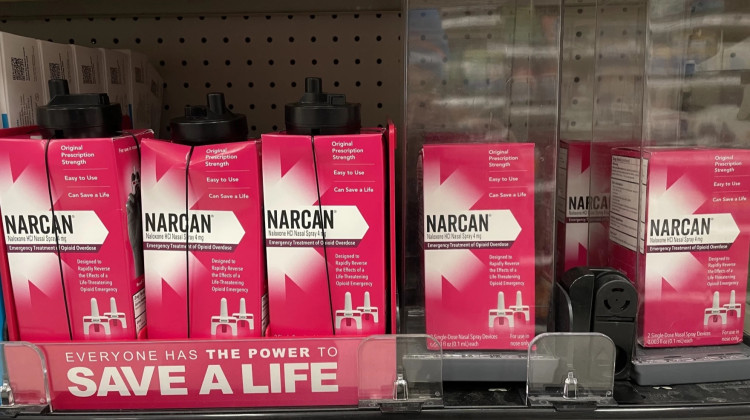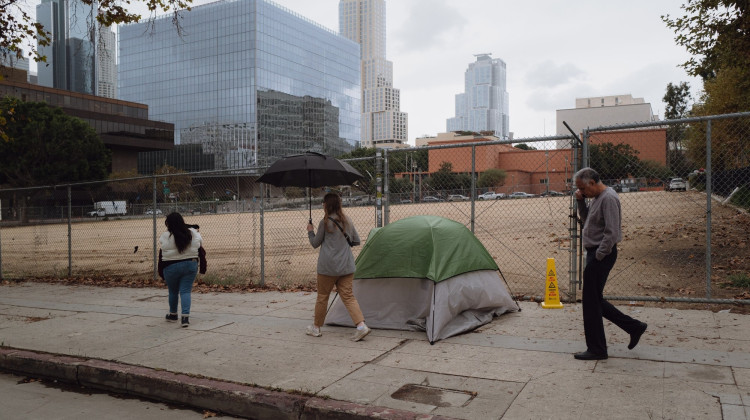
Indianapolis shut down several streets to allow restaurants to expand outdoor seating. Along these streets signs remind people to maintain six feet of distance.
Lauren Chapman/IPB NewsThe Indiana State Department of Health reported 37 additional confirmed deaths since Sunday, bringing the state’s total to 2,158. The state announced more than 38,000 total confirmed cases, with more than 315,000 Hoosiers tested.
Expanded Vote-By-Mail Looks Unlikely For November Election
It’s currently unlikely Hoosiers will have access to expanded vote-by-mail for this fall’s general election.
Republican leaders aren’t endorsing it after using it in the primary.
Concerns around COVID-19 prompted Indiana leaders to allow any Hoosier who wanted one to get a vote-by-mail ballot this year. And around 500,000 more people did so than in the 2018 or 2016 primaries. Democratic leaders like state party chair John Zody say that’s why it’s needed in November.
He says especially if coronavirus cases spike again this fall, counties need time to prepare for once again using expanded vote-by-mail.
State Leaders Leave COVID-19 School Reopening Plans To Local Health Departments
School leaders and educators are still figuring out what the state's latest guidance on how to reopen buildings means for them. Many worry about how to pay for some of the changes, and whether or not all of them will be needed – or possible – in different parts of the state.
During a webinar with school leaders Tuesday, Superintendent of Public Instruction Jennifer McCormick echoed the governor and state health commissioner's past comments on how closely they expect schools to follow the guidelines. She says it's largely up to local health departments to decide if schools are doing enough.
"Do not forget that ultimately, the local health department can shut you down," she says.
One-Time Utility Benefit Available For Some Affected By COVID-19
Hoosiers whose jobs were affected by COVID-19 could get access to some help with utility costs.
Those who lost their jobs – or had hours significantly cut back – can receive up to $350 in a one-time benefit to pay their utility bills.
Lt. Gov. Suzanne Crouch says the money comes from the federal CARES Act.
“This benefit is available both to individuals that have already received an energy assistance benefit or to new individuals who have not yet applied,” Crouch says.
Indiana Career And Technical Education Courses 'Piloting' The Way For In-Person Class
Career and Technical Education programs across the state are preparing to offer in-person classes to high school students in July. It could be the first time students take classes in a school building since the pandemic began.
The Indiana Office of CTE issued guidance telling schools that, beginning July 6, they can offer a “summer bridge program” to students whose courses were disrupted by COVID-19. However, the timeline could change if Indiana doesn’t progress to the final stage of the state’s “Back On Track” plan.
Join the conversation and sign up for the Indiana 2020 Two-Way. Text "elections" to 73224. Your comments and questions in response to our weekly text help us find the answers you need on COVID-19 and the 2020 election.
Patrick Biggerstaff is the CTE director of a career center in Indianapolis. He also sits on a Governor’s Workforce Cabinet group on reopening. He says several CTE courses require hand-on experience in order for students to get certifications.
“When looking at a subject area like automotive service or welding, it’s important that students have time to demonstrate skill proficiency and to work hands-on with equipment that will be used in industry,” he says.
Indiana Casinos Get Green Light From State To Reopen
Indiana’s casinos have been given the green light to reopen after COVID-19 shut them down for nearly three months.
The state Gaming Commission says they can open to the public – at reduced capacity – beginning June 15.
Casinos were required to submit health and safety plans before the state would allow them to reopen. Those plans were detailed: employees, patrons and vendors will undergo daily health screenings. And employees can’t be penalized for missing work if they have COVID symptoms (or test positive for the virus).
The number of gaming positions is significantly reduced, with additional limits on the number of players at table games. And those table game players – along with all employees on casino floors – must wear masks.
BMV Set To Allow Walk-In Customers At Branches
The Bureau of Motor Vehicles will soon reopen to walk-in customers at its branches statewide.
It will do so June 15, as the state is set to enter the next phase of its reopening plan.
The BMV first reopened to in-person business in May. But it was restricted to appointment only.
Now, the agency will allow walk-in customers at its branches, most of which are open Tuesday through Saturday. It will still limit the number of people inside at one time, marking positions outside where people can wait in line.
Ag Barometer: Farmer Sentiment Up, But Most Still Financially Concerned Due To COVID-19
A survey of farmer sentiment improved slightly in May after dropping substantially the last two months. Most respondents are still concerned about profitability due to the novel coronavirus pandemic.
The national Ag Economy Barometer conducted by researchers at Purdue University shows more than a quarter of farmers say they will be looking to reduce farmland rental prices.
This comes as conversations between landowners and tenants are set to start this summer.
The survey responses show more than 70 percent of agricultural producers are still worried about profitability due to COVID-19.
Where Are Nursing Home Residents Dying Of COVID-19? In Indiana, It’s Hard To Say
Treva Steele visited her father every day after he moved to Greenwood Healthcare Center in Greenwood, Indiana, in February. Joe Barton, who was 73, was recovering from open heart surgery and on a ventilator.
On one of her visits, Steele walked into his room and saw him gasping for air. Soon, staff were performing CPR.
“He was basically dying in the bed in front of me,” Steele says.
Barton was rushed to the hospital, and got better after a short stay. Steele was concerned about his care at Greenwood. Nursing homes had restricted visitors to limit the spread of COVID-19, so she wouldn’t be able to continue visiting him every day. But he went back to the nursing center in mid-March.
“I almost thought like, OK, great, I'm sending him back to the wolves,” Steele says.
Back at Greenwood, Barton contracted a bacterial infection. He was hospitalized a second time in April, and died there last week of factors including complications from COVID-19.
New federal data show nearly 32,000 Americans in nursing homes have died of COVID-19. And in many states, including Indiana, long-term care facilities account for almost half of total COVID-19 deaths.
Contact Lauren at lchapman@wfyi.org or follow her on Twitter at @laurenechapman_.
 DONATE
DONATE







 Support WFYI. We can't do it without you.
Support WFYI. We can't do it without you.